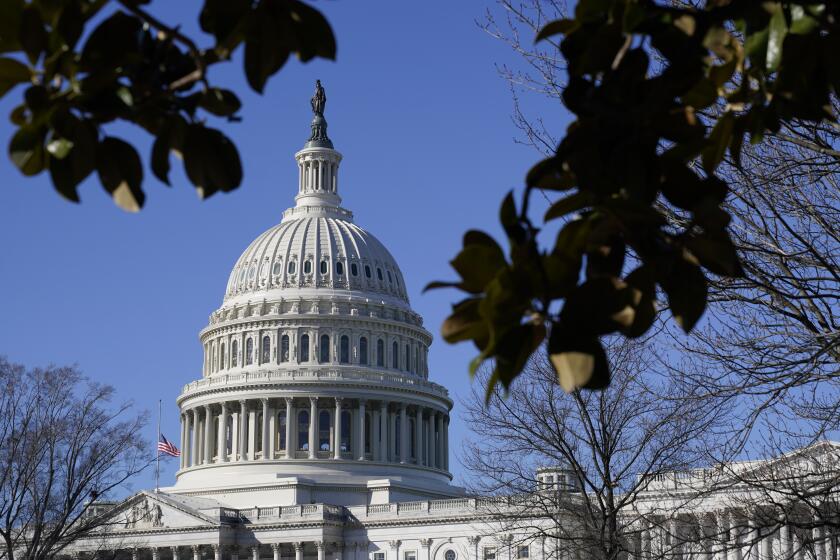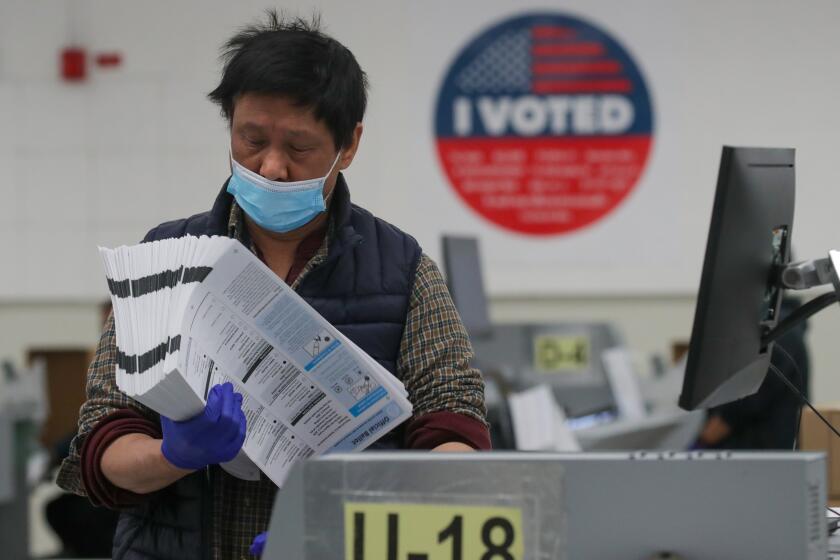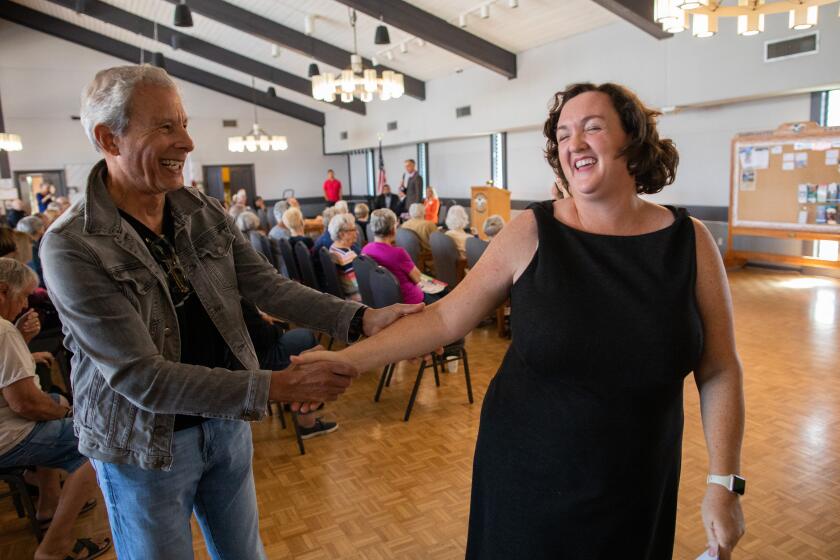Democrat Christy Smith knows she’ll lose her congressional race. She blames her own party

- Share via
The race for a hotly contested Los Angeles-area congressional district had not been called, but Democrat Christy Smith sensed she would end up on the losing end. And she felt there was a clear reason why.
“Our campaign got next-to-zero outside resources to fight this battle. In fact, I was fighting the institutional power of my own party from the outset of this race,” Smith said in a scathing series of remarks on Twitter. With no help on the airwaves and little elsewhere from Democratic Party committees and PACs, “we didn’t stand a chance.”
Smith is no different from scores of other candidates who believe victory would’ve been theirs if not for stingy support from Washington. But her unusually blunt remarks Sunday highlighted the stark turn of events in the campaign for California’s 27th District — a contest in which Democrats were expected to mount an all-out effort to oust incumbent Rep. Mike Garcia after he barely eked out a win two years earlier.
The battle for control of Congress was surprisingly close as Republicans fell short of their hopes for a ‘red wave’ election against Democrats.
“This is a massive screw-up on their end,” said political consultant Brandon Zavala, who ran Smith’s 2020 campaign but did not work on this year’s race. “We’re looking here at a Biden plus-12 [district] that we’re about to hand to Republicans.”
The typical postelection second-guessing of spending decisions has sharpened in the wake of Democrats exceeding expectations in this midterm election. Instead of losing control of the House in a rout, the party nearly held the GOP to a draw, with Republicans probably now on track to have a bare-bones majority. Now, every spending decision in close races in California and across the country could have tipped the balance enough for Democrats to keep House control.
In the midterm election, California swayed control of Congress and the last races added to Republicans’ margin of power. Here’s where House races stand.
Republican Rep. Mike Garcia and Democrat Christy Smith faced off for the third time to represent a northern Los Angeles County district in Congress.
Veterans of past midterm elections cautioned that such armchair quarterbacking misses the whole picture of how parties decide where to devote resources.
“In hindsight in any election, the easiest thing to say is, ‘I wish I had done more of X,’” said Jesse Ferguson, a Democratic strategist and a former top official at the Democratic Congressional Campaign Committee. “The hardest thing is, ‘I would’ve done less of Y’ in order to pay for it.”
Smith’s woes underscored a particular challenge for candidates running in the Los Angeles media market, where reaching voters via television can be prohibitively expensive. In a year when Democrats were playing defense all across the country, the party opted to stay out of Los Angeles’ broadcast market entirely — a decision that reverberated through closely watched congressional races.
In Orange County, Democrat Jay Chen was outspent by roughly $5 million, according to AdImpact, a firm that tracks television and digital ads, in his unsuccessful bid to unseat GOP Rep. Michelle Steel, who got millions of dollars of assistance from the House GOP campaign arm and allied outside groups. GOP Rep. Young Kim had around $500,000 more in advertising than her Democratic challenger, Asif Mahmood, whom she easily defeated.
Porter has money and fame, but Republican Scott Baugh is betting on Orange County’s traditional conservatism to flip her House seat.
Democratic Rep. Katie Porter, who remains locked in a close contest with Republican challenger Scott Baugh in Orange County, also got no advertising help from the Democratic Congressional Campaign Committee, although her commanding fundraising meant she had plenty of funds to outspend her opponent. In Riverside County, Will Rollins, the Democrat who challenged incumbent Republican Rep. Ken Calvert, had a slight advantage on-air, but his unexpectedly narrow loss made some allies wonder whether more party help could’ve made a difference.
“With greater investment from the party leadership, Democrats could have flipped the [seat]. We hope the close nature of this race leads to a meaningful investment in this district — and in breakthrough candidates like Will — moving forward,” the liberal nonprofit group Square One said in a statement.
The Rollins and Mahmood campaigns declined to comment about party spending decisions. A Chen spokesman lauded the DCCC’s help reaching the district’s multicultural voters, including with digital advertising in Vietnamese, Korean and Mandarin. “While the outcome in this race fell short of what we had hoped for, the DCCC ... was an engaged partner,” spokesman Orrin Evans said.
Los Angeles is one of the most expensive media markets in the nation even before a flood of advertising for the city’s mayoral race and statewide gaming initiatives pushed prices higher.
Sheri Sadler, a veteran Democratic media buyer, said the market was so expensive that she didn’t place ads in L.A. for state controller candidate Malia Cohen. “You have to have a war chest in L.A.; that’s just the way it is,” Sadler said, adding that effectiveness of broadcast ads is declining as viewing habits change.
“The prices keep going up and the ratings keep going down,” she said.
Drew Godinich, a Democratic strategist, said such costly media markets can “act as protective bubbles for incumbents.”
“For challenger candidates, it’s a high barrier to entry — the cost of first defining yourself positively, and then defining your opponent, is nearly prohibitively expensive,” said Godinich, who worked for the DCCC in California in 2018
Nowhere was the party’s absence more acute than in the 27th Congressional District, which includes Santa Clarita, the Antelope Valley and parts of the San Fernando Valley. The once-solidly Republican region has grown more Democratic as Los Angeles residents moved there seeking affordable housing. Redistricting — the every-decade redrawing of congressional maps following the census — made the district even bluer by excising the conservative Simi Valley.
Garcia handily beat Smith in a special election in 2020 and by just 333 votes for a full term later that year. In that election, Smith, along with the DCCC and House Majority PAC, which is affiliated with Speaker Nancy Pelosi (D-San Francisco), spent nearly $10 million.
Soon after winning reelection, Garcia joined 146 other House Republicans in objecting to the full counting of the electoral college votes, an effort to overturn Biden’s win in the presidential election. The vote came just hours after Trump supporters overran the Capitol on Jan. 6.
The Republican maintained a conservative voting record: He opposed impeaching President Trump for his role in the insurrection, voted against citizenship for “Dreamers” and co-sponsored legislation that would have in effect banned abortions nationwide.
But he also worked on issues tailored to the district, particularly with regards to military families and veterans — a potent issue in a region with deep ties to the armed forces and the aerospace industry. His ads highlighted his background as a former Navy fighter pilot and focused on fiscal issues such as lowering taxes.
Smith, in an interview, said she lacked the money to tell voters about Garcia’s record, a message that she believes could have tipped the race.
“Absolutely it would have made a difference,” Smith said, adding that as she was getting “hammered” on television by outside GOP groups. “There was plenty to communicate if we had the resources to communicate.”
With the possibility that the district would be “the tipping point to hold the House,” Smith said on Twitter, “the utter lack of investment made no sense.”
Smith also faulted national Democrats for recruiting former Navy intelligence officer John Quaye Quartey to run against her in the primary. (Quartey’s campaign declined to comment on the issue, as did the DCCC.) Smith said she and her allies had to spend heavily in the primary to defeat Quartey, who ultimately received single-digit support.
Garcia and Republican groups spent more than $7 million on advertising between Labor Day and election day, while Smith spent less than $1 million; Democratic allies spent less than $50,000 on digital ads, according to AdImpact.
This year, the House Majority PAC booked $3.3 million in television time in Los Angeles, but canceled it, as they did in other races around the country. A spokesman for the committee did not respond to a request for comment.
The DCCC never booked a dime. A spokeswoman said the committee faced unprecedented spending by Republican groups.
“We had to make tough calls and fully invest in the candidates we believed could not only get close, but win difficult races in California and nationwide,” Maddy Mundy, a DCCC spokeswoman, said.
The National Republican Congressional Committee and the Congressional Leadership Fund, which spent heavily promoting Garcia, did not respond to requests for comment. Nor did Garcia’s campaign.
As of Tuesday evening, the race had not been called by the Associated Press. Republicans remained on the cusp of capturing the House majority, needing only one more win.
Garcia declared victory the day after the election and applauded Smith for “jumping in the ring again.”
While Smith has not conceded, she acknowledges that her likelihood of overcoming Garcia’s lead is unlikely. She said in an interview that she felt it was important to speak out before the race is called.
“I wanted to put the narrative out at a time when hopefully it didn’t seem like sour grapes,” Smith said. “Regardless of the outcome of this particular race, I still have a responsibility as a Democratic leader in the state to highlight areas where we could be doing better.”
Jacob Rubashkin, an analyst with Inside Elections, a nonpartisan campaign newsletter, said he was sympathetic to Smith, but he also recognized why national Democrats pulled back.
“You have to consider any Democrat that’s losing any Democratic district that is being won by a Republican despite Joe Biden carrying it by double digits has to be considered a missed opportunity,” he said. “But I’m not surprised at all by this result.”
He said Smith’s history in the district explained the party’s decisions.
“I think Democrats took a look at 2020, when Joe Biden won the [district] by 11 points or so they spent $10 million to support Christy Smith trying to beat Mike Garcia. Then she came up just short. Then they looked at how her campaign was going over the summer. And they triaged. They decided that the money was better spent elsewhere,” Rubashkin said.
The grousing about missed opportunities is ironically a product of Democrats’ success, because any single race could be decisive in the closely fought battle for the House majority, said Ferguson, the DCCC veteran.
“In a narrow election the postmortem is a bunch of woulda, shoulda, coulda. In a wave election, the postmortem is a bunch of ’welp,’” he said. “In a landslide election, there’s no hand-wringing about what minor changes might have made a difference.”
More to Read
Get the L.A. Times Politics newsletter
Deeply reported insights into legislation, politics and policy from Sacramento, Washington and beyond. In your inbox twice per week.
You may occasionally receive promotional content from the Los Angeles Times.
















